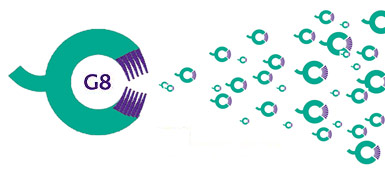Socialist's Social
The Belgian one was playing away on some far flung Hebridean island in the wind and rain with her mum and brother for a long weekend, leaving muggins here stuck behind to demonstrate in lab practicals (fish dissections! ooh, the fun we had!) and mark papers.
I did however manage to drag myself away from the workload long enough to attend the Socialists Sunday School. This workshop, set up to provide forums for discussion about various issues, included speakers from various organisations including the Scottish Socialist Party, Socialist Workers Party and G8 Alternatives.
Alan McCombes started things off with a talk about Marxism in a modern day context. He highlighted that Capitalism is a system that allows an oligarchy (government by the few) or a plutocracy (government by the wealthy) to accumulate capital and thereby restrict the natural circulation of wealth through the economy. He stated the importance of working-class self emancipation as the only means by which social reform is possible. People often think of Socialism or Marxism and immediately leap to visions of Stalin's Russia, North Korea, and China - but this is Communism, not Socialism. The difference being that Communism is centred around the idea of the state as a central repository of economic wisdom, agency and control, whereas in Socialism, it is 'the workers' who ultimately hold the power.
This was demonstrated by the next speaker, Mike Gonzalez, in his talk on Venezuela. Venezuela provides no less than 13% of the world's oil, when you consider that Iraq supplies 17%, it is no wonder then that the US has been equally "interested" in the country's political affairs. Since the 1970s, Venezuela’s middle and elite classes have been profiting from the nation’s lucrative oil industry, despite it being a supposedly state-owned industry. However, when the socialist Hugo Chavez was democratically elected in 1998, he set about re-establishing state control of the industry and using its substantial profits to improve conditions (health, eductaion, housing) for the country's poor. None too pleased with his actions, Venezuela’s upper class minority, backed by US dollars, tried on three attempts to oust Chavez. On each occasion, it was the poor workers who's voices were heard. With 80% of the population living in poverty, it is not surprising that each time Chevez has come bouncing back.
The system in Venezuela is not the ideal, with a solitary president incharge, there will always remain the possibility of it turning into a dictatorship - but the important message we should take from the Venezuelan people is what can happen when people use their voice. It makes you think what we could have really done to stop the War on Iraq two years ago.
The final speaker, Donny Nicholson (SSY, G8 Alternatives) rounded up the day with a motivating talk about the G8. Sarah and I had already booked into our diaries the events taking place after previous meetings and demos we had attended. These include Make Poverty History demo Edinburgh 2 July; Alternative Summit Edinburgh 3 July; Anti-nuclear demo against Britains WMD Faslane and Dungavel 4 July; Culminating in the Anti-G8 protests Gleneagles 6 July.
These demonstrations are not just somewhere for international anarchists and trouble makers to cause trouble. The people attending these demonstrations will be local Scotts (and British) who want to go out and make their voices heard - that George Bush, the other First World Leaders, and their greedy Capitalist ways are not welcome here. It is a unique opportunity not just in Scotland, but the UK as whole, for people to unify, realise their strength, and demand change.



0 Comments:
Post a Comment
<< Home